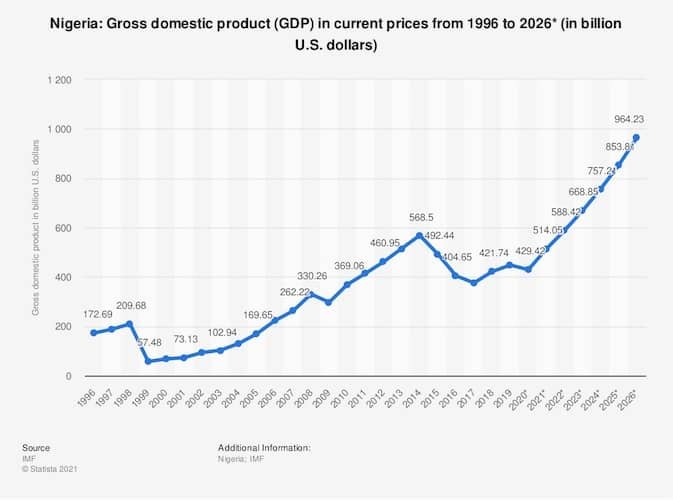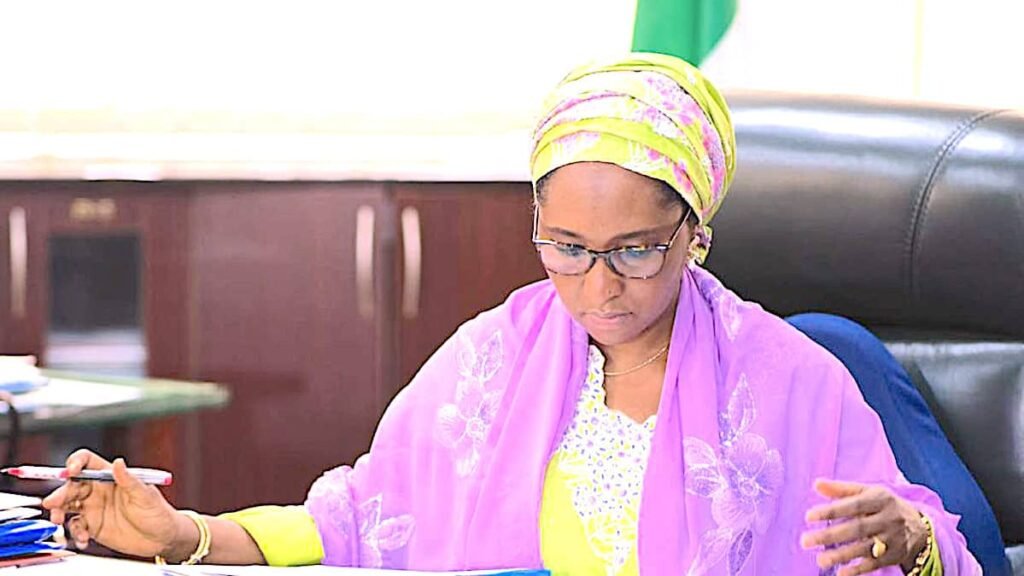Nigeria recently released updates on the economic projections for 2021-2024 Gross Domestic Product, GDP, Expenditures, Inflation and Exchange Rates, among other areas of concern.
On the state of the nation’s GDP, the Federal Government hinted that it is expecting an increase in the percentage from the predicted 2.5% to 4.2% in 2022, even though the initial forecast of 3% in 2021 remained unattainable.
Making the presentation was the minister of Finance, Budget and National Planning, Mrs Zainab Ahmed, at the “Public Consultation on the Draft 2022 to 2024 Medium Term Fiscal Framework and Fiscal Strategy Paper, MTFF/FSP, yesterday, via zoom platform.
Giving precise details on the GDP projections, Mrs Zainab stated Nigeria is expecting a rise to 4.2 per cent in 2022, then a drop to 2.3 per cent in 2023 and up to 3.3 per cent in 2024.
According to an Agency Report, the minister further said the nominal GDP projected for 2022 was N184.38 trillion, up from N168.6 trillion in 2021, and then to N201 trillion in 2023 N222 trillion in 2024.
She also said the inflation rate would drop slightly to 13 per cent in 2022 from 15 per cent in 2021.
Mrs Ahmed noted that the increase in inflation was due to the exchange rate.
She said that the inflation rate was earlier planned for 11.95 per cent in 2021 and has been reflected in reality because the exchange rate is high, adding that the existing average so far is 15 per cent.
The finance minister explained the country is also expecting 2022 to go down slightly to 13 per cent, then 11 per cent in 2023 and 10 per cent in 2024.
She, however, said the federal government had put the Nigerian Autonomous Foreign Exchange Rate Fixing, NAFEX, of N410.15 to one US dollar for 2022 to 2024.
2021-2024 Economic Projections

Still, on the Economic projections, Zainab Ahmed revealed that the Naira exchange rate to the dollar, which was N379 in the 2021 budget, adjusted to the NAFEX rate of N410.15 to one US dollar, unsure about the same rate 2022, 2023 and 2024.
She briefly explained the federation and fiscal outcomes for Value Added Tax, VAT, Pool Accounts Distributable for January to May.
The minister noted that the amount available for distribution from the Federation Account was N2.78 trillion.
“Of this amount, the Federal Government received N998.57 billion, while the states and local governments received N506.59 billion and N390.48 billion respectively from the Main Pool Account.
“Federal, state and local governments received N132.70 billion, N442.33 billion and N309.63 billion respectively from the VAT Pool Account.” She said.
According to Ahmed, the gross oil and gas revenue was projected at N5.19 trillion from January to May.
As of May, Nigeria realised N1.49 trillion out of the distributed sum of N2.16 trillion, Zainab said, adding that figures represent 69 per cent performance.
Reasons for the estimations above centre on the point that Oil and gas deductions were N194.31 billion or 45.8 per cent more than the budget.
The Honourable said that fluctuations are mainly attributable to petroleum subsidy costs that did not provide for the 2021 Budget.
Also, after clearing out deductions, including 13 per cent derivation, the remaining oil and gas revenue inflows to the Federation Account amounted to N872.16 billion.
She noted that from the economy, the inflow was N864.20 billion or 49.8 per cent less than the projection as of May.
Giving an update on the revenue performance of 2021 budget implementation for January to May, Mrs Ahmed said the federal government’s retained revenue was N1.84 trillion, 67 per cent of the allocated target.
She said the share of oil revenues was N289.61 billion, which represented 50 per cent performance. She also added that non-oil tax revenues totalled N618.76 trillion, 99.7 per cent of the allocation.
“Companies Income Tax, CIT and VAT collections were ahead of the budget targets with N290.90 billion and N123.85 billion, representing 102 per cent and 125 per cent respectively of the pro-rata targets for the period.
“Customs collections was N204.0 billion (86 per cent of target).” The minister revealed.
She said other revenues amounted to N762.70 billion, of which Independent revenues were N487.01 billion. On the expenditure side, the minister said Nigeria had spent N4.86 trillion, representing 92.7 per cent of the prorated budget.
The finance minister to time out to describe that N1.80 trillion was for debt service representing 37 per cent of federal government’s expenditure and N1.50 trillion for personnel costs, including pensions, representing 31 per cent of the federal government’s revenues.

